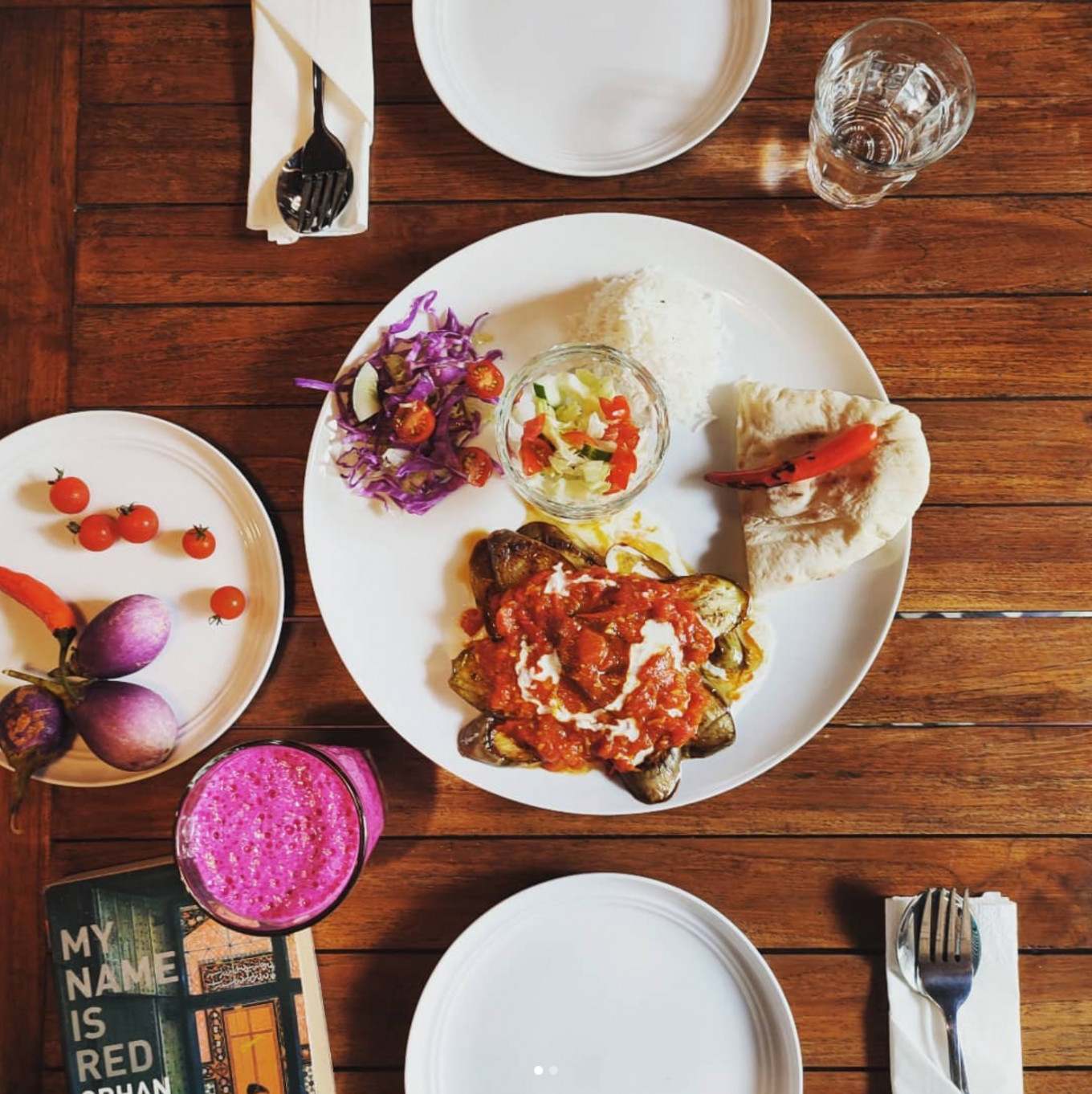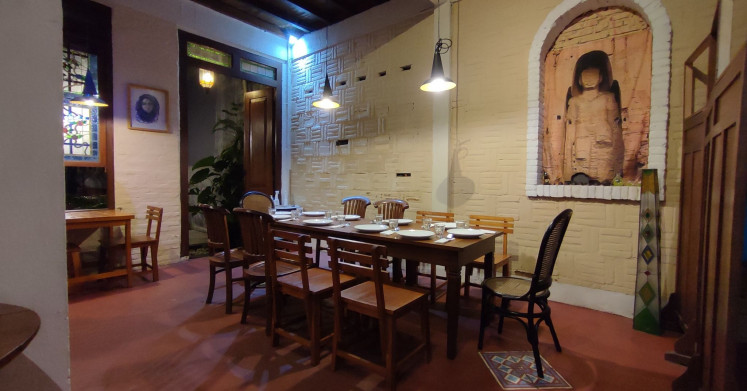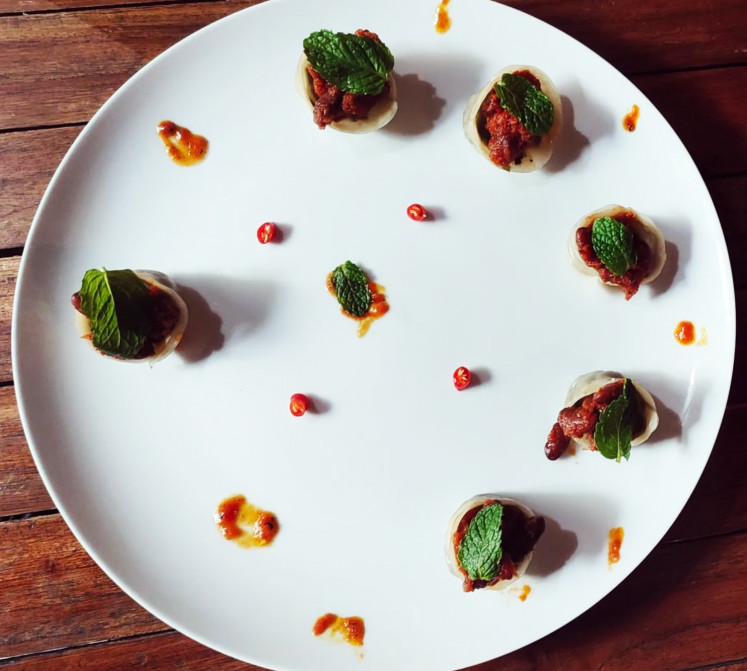Popular Reads
Top Results
Can't find what you're looking for?
View all search resultsPopular Reads
Top Results
Can't find what you're looking for?
View all search resultsFood from the heart: A hidden Afghan restaurant in Yogyakarta
This is the story of an out-of-job travel agent and an Afghan refugee who started a private dining restaurant, The Tannoor, in Yogyakarta
Change text size
Gift Premium Articles
to Anyone
D
uring my visit to Yogyakarta back in October 2021, a friend, who is an art curator, told me that her artist husband was holding scheduled naan (leavened, oven-baked flatbread) workshops at the Jogja Biennale XVI as a collaborative project with another artist, who happened to be an Afghan refugee that had been living in Yogyakarta for a couple of years then.
Sadly, the steel tanoor (the artists referred to the apparatus this way), or tandoor, which is the naan oven that the artists DIY-ed together, was sitting idly as an installation at the exhibition when I was there. “It was not meant to be,” I thought. I left the city without meeting the Afghan artist, let alone tasting the naan bread he made.
Under the drooping branches
In August last year, I found myself back in Yogyakarta with my wife, soaking in the sun's warmth in our curator friend's backyard as we stared at whatever plants were growing on a row of three plant beds made of iron sheeting. I noticed the steel, three-wheeled tanoor sitting idly underneath the shades next to the kitchen’s entrance. It had the word naan spray-painted in Arabic on its side.
“Alright,” said my curator friend as she pulled out her phone and started messaging someone. She was making a dinner reservation at a place called The Tannoor, an Afghan cuisine restaurant where the Afghan artist sometimes helped out.
As it turned out, the restaurant might be one of the lesser-known, best-kept secrets of today’s Yogyakarta dining scene.
A short walk south from the junction where Jl. Prawirotaman and Jl. Tirtodipuran branched away, The Tannoor is a well-hidden place located near one end of Jl. Sartono.
Private dining: The Tannoor's humble physical establishment, which Amelia and Mumtaz settled into a year after operating online. (Courtesy of The Tannoor) (Archive/Courtesy of The Tannoo)On top of the nonexistent signage board, in exchange for stacks of stone blocks underneath a towering tree to serve as a gate, its entrance was further nestled through a stone-paved alley lined with fairly lush greenery around a wooden, walled gazebo.
As I made my way around the pavilion, a stocky, bearded man in shorts and sandals stood at the entrance. He waved his hands with a hint of unsureness, seemingly uncertain of the unfamiliar face approaching the entrance.
“Ah, a friend of Timbil and Riksa!” he said. Neither of them had arrived. The man was Mumtaz Khan Chopan, an Afghan artist and a refugee. Mumtaz spent most of his life as a refugee living in Pakistan since 1996, then moved to Indonesia in 2013.
Gustatory bliss
Mumtaz served a pot of sheer chai, a sweet, thick milk tea with a decent tang of cardamom and cinnamon but not overwhelmingly spicy. “Have you tried Afghan cuisine before?” he asked. I was raised in a family that fonded Middle Eastern food, but reckoned that the term would not fit Afghan cuisine well. “Qabuli palav [kabuli rice], maybe? But that’s about it,” I said.
The menu? I was entirely at the mercy of Riksa’s ordering ahead of our arrival, utterly unaware of anything I would eat before each of the dishes was neatly served, bow-tied, metaphorically, of course, in front of me.
A pair of chicken shawarmas arrived in tandem with a pair of potato samosas as hors d'oeuvre on rectangular plates. The sauce, served in a dessert glass, towered over the shawarmas and samosas. I was expecting a mint chutney to come with the samosas, but I realized it might be outside of the Afghan configuration.
Plates of beef qabuli palav and chicken biryani then arrived in turn. The presentation was relatively simple and humble, but the flavor was complex and foreign enough to the Indonesian tongue, due to the contrasting set of spices that Afghan cuisine uses compared to Indonesian cuisine. Everything that arrived on the table was delightfully piquant.
“This one here is mantu,” said Mumtaz as he served a finely arranged plate of what seemed to be dumplings. The mantu is ground beef dumplings filled with minced tomato and split peas. A gyoza-like dish drenched in tomato red struck me as remarkably Eastern Asian and European at the same time.
I pondered the origins of dumplings and how the dish may be an offspring of the Eurasian trade route Silk Road when Mumtaz served another, this time chive-based dumplings and a tall glass of salted yogurt that was blended with cucumber and mint called doogh.
The dish was not experimental, however, nor was the gustatory experience unique, outside the well-defined notion of Afghan cuisine. It was simply authentic Afghan recipes delivered in an almost no-frills approach.
The agent and the refugee
The loft house that The Tannoor resides in was peculiarly decorated. The walls were aptly lined with Mumtaz’s rather-harrowing paintings and illustrations. A reclining Buddha figure peeked out of a hole in the horizontal/vertical-patterned exposed brick wall painted in beige, looking over a golden Ganesh hanging on a string strewn horizontally across.
At the far end from the entrance was one of the Buddhas of Bamiyan, placed within a wall niche with ornaments in front of it that made it look like a shrine. I gawked at the terrifyingly accurate details of the statue, which I pointed out when I spoke to the owner, Amelia Destari, back in November 2022.
“It was printed fabric, Mas,” Amelia said with a chuckle. Amelia, a member of the Faculty of Psychology from the Islamic University of Indonesia (UII, class of 2000), who owns the establishment also doubles as The Tannoor’s chef. The authentic Afghan dish served at The Tannoor are products of Amelia’s self-taught hands. She ran a travel agency, Tunas Indonesia, and was out of a job when the pandemic hit in 2020.
“I still got dressed and went to work [back then], but only to [delay] or cancel my clients’ plans and reservations,” Amelia said with a dry laugh. “I didn’t have anything to do after that.”
Authentic: The dish at The Tannoor are based on the Mumtaz's family's dishes as an Afghan household. Pictured is vegan aashak dumplings. (Courtesy of The Tannoor) (Archive/Courtesy of The Tannoo)Amelia’s run-ins with Mumtaz went as far back as 2015, during an art exhibition in the city, well before he moved there in 2016. Their communication got more intense after that.
“Why don’t you try cooking?” Amelia imitated what Mumtaz said to her in 2020 when she had nothing to do. Amelia could cook, but not Afghan food, and was unsure how they would sell the food they would cook. “Online?” Mumtaz mused.
“But honestly, I never cooked in a professional setting before,” Amelia laughed.
“[Mumtaz] joined an expatriate community group on Facebook,” remembered Amelia. Once he posted their new venture there, Amelia immediately started receiving Whatsapp notifications. “It was a lot. We did it non-stop for a year.” Amelia initially cooked lunch and dinner twice a week. She prepared at least 40 portions of food each session (lunch or dinner). It ballooned to the point where people started asking why they had no restaurant.
When Mumtaz was looking for a space for his art studio, Amelia thought it might be time. They then shared the space, where Mumtaz used the upper story for his art studio and the lower to accommodate dine-ins.
Now she runs The Tannoor as a restaurant with Mumtaz, who acts as an outside consultant. He gives her Afghan cuisine recipes that his mother cooked him in the past during his days in Pakistan and Afghanistan. “He even called his mother and sisters,” Amelia said.
The Tannoor is located at Jl. Sartono No. 827, Mantrijeron, Yogyakarta













